Saturday links (Torino edition)
Insights and research on AI, behavioral economics, exciting economics workshop at Collegio Carlo Alberto, Kahneman’s last interview, waking up to many people singing "Wonderwall" at 1am and more
Greetings from Torino Italy! Day one. I arrived here at 5pm Friday afternoon. I met my host on Airbnb, a nice gentleman who explained the little apartment to me. It’s a beautiful place. I walked around, had dinner, walked to collegio carlo Alberto, took some pictures came back, fell asleep at 9pm, then woke up at 10:30pm, went back to sleep, then woke up at 1am to the sound of revelers at the bar next door singing “Wonderwall” by Oasis. It was more lovely than I can express. It will be what I hope is the first of many such nights only next time I plan to be among them. Sam sings “Wonderwall” after Richmond beats Liverpool at karaoke night in season one of ted lasso, and so it is a song I associate with bonding, new friends, new beginnings, and heartfelt songs we all know and all sing together. And that is what I hope the second half of my life will be — songs we all know and we all sing together, even if afterwards we all have to go our separate ways.
Saturdays on my substack are where I share links that have been open in my phone and browsers. I decided to only use the links on my phone though. The laptop is a hoarder nightmare and I will probably need more than karaoke night to give me the fortitude to close those tabs. But before I get into those, I wanted to share some pictures of my cute little one bedroom Airbnb in Torino Italy, where I am living for the next 30 days as a kind of “faculty in residence” at Collegio Carlo Alberto. Here is the outside.
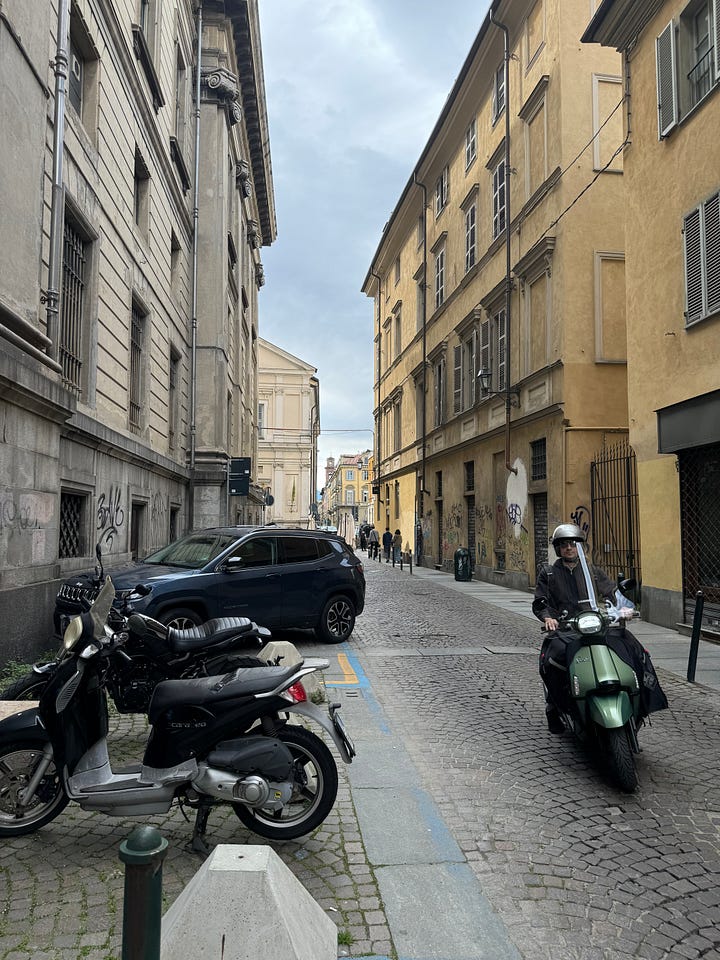
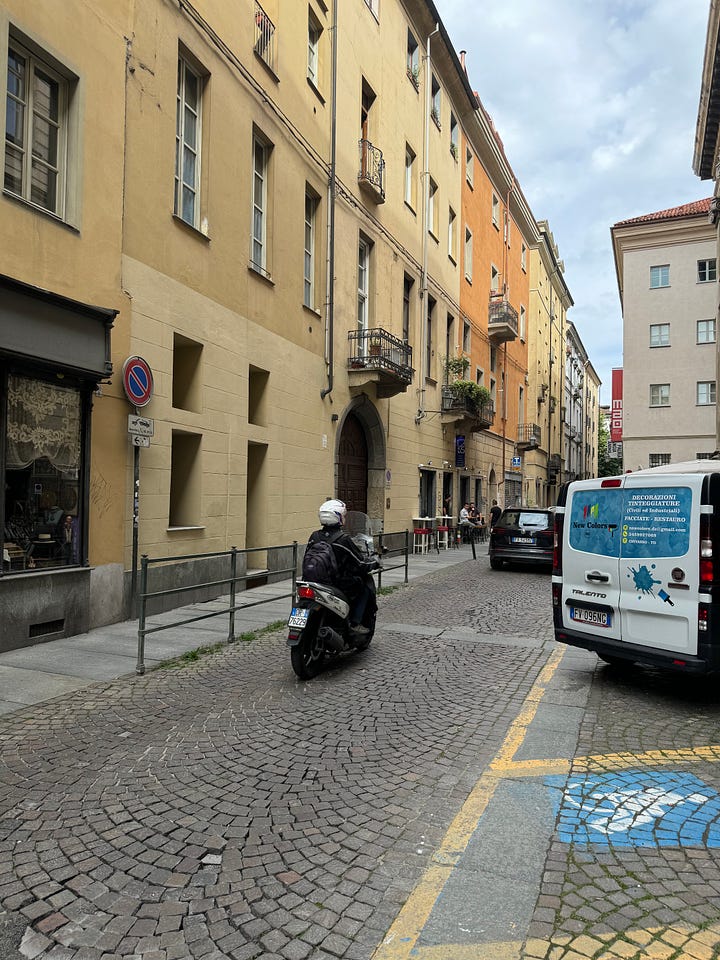
And then here is my cute one bedroom two story apartment including shots from the balcony of the surrounding area.









I am very close to Collegio Carlo Alberto. I can almost hit it with a rock. It’ll take me five minutes to walk there. And there is this coffeeshop I would frequent constantly when I was last here in November 2022 (I was here then for two weeks for Caterina Muratori’s dissertation defense and for a week long diff in diff workshop). I was there every day drinking so many cappuccinos and somehow paying almost no money for them. Anyway it’s this one — the Moonlight Cafe. It’s adjacent to CCA.
One of the cool things happening at CCA this weekend is a four day economics workshop with an all star cast of speakers. I took some pictures for you to see the names. I sadly got here too late to hear Card speak. But tomorrow I’ll go.
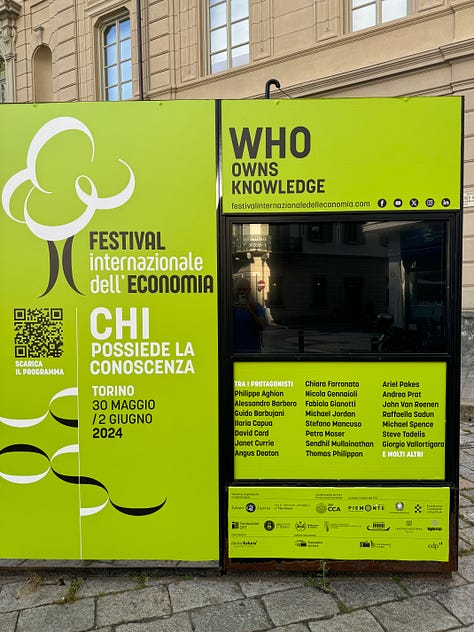
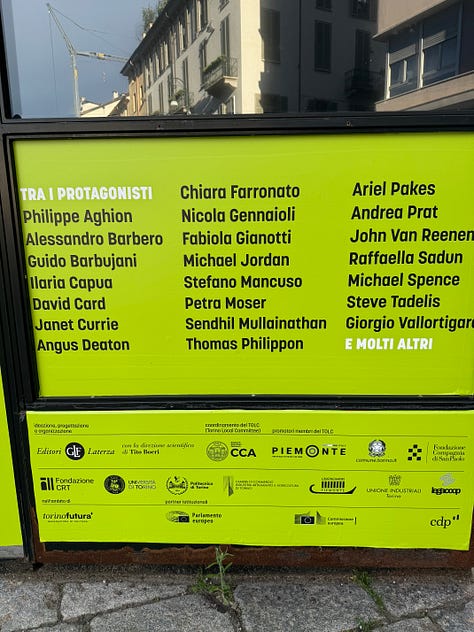
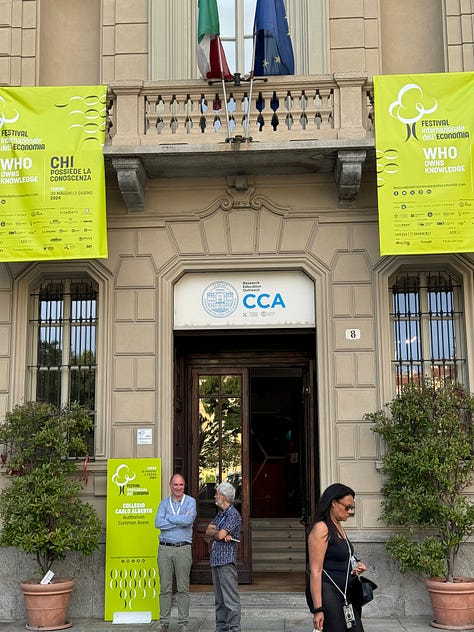
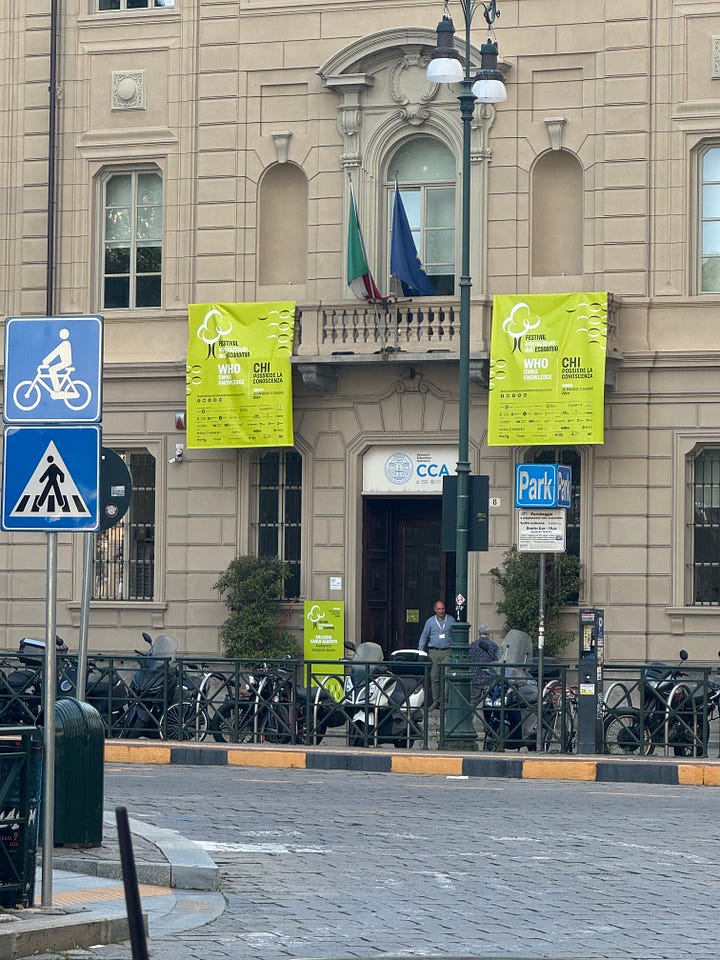
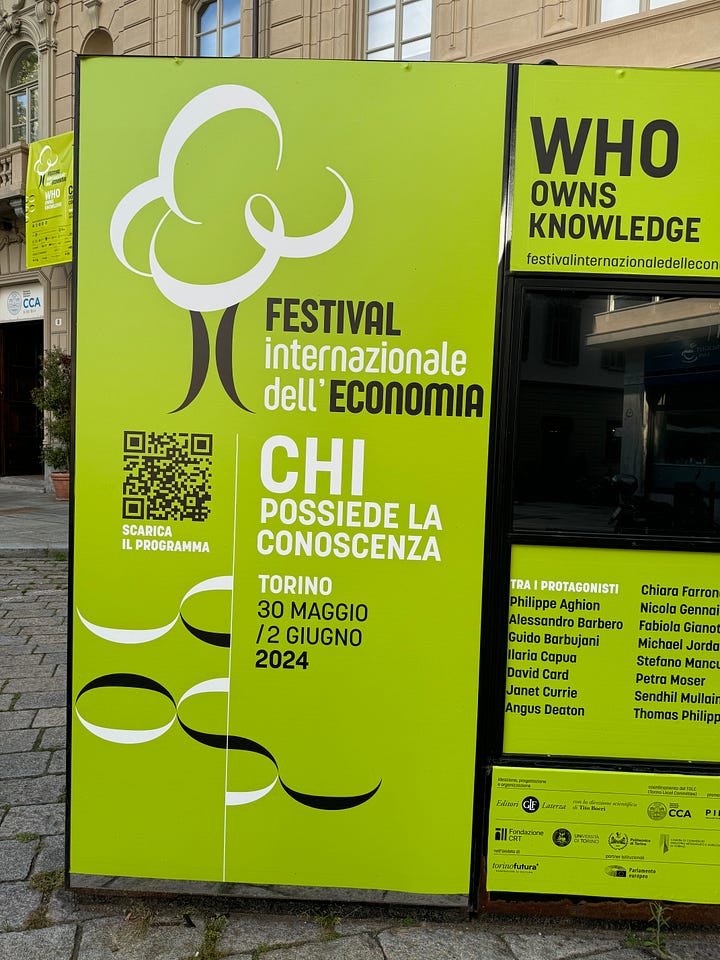
But just look at the speakers. David Card, Angus Deaton, Sendhil Mullainthan, Janet Currie, Josh Gans, Michael Spence, Ariel Pakes, Steven Tadelis, and more. The conference is wild because they are showing one to two movies every night. I already missed Minority Report. We should show more movies I think at our economics conferences. Surely zero movies at our American economics conferences cannot be optimal. Here’s a link to the full spread if you’re curious. A lot of it is about artificial intelligence so obviously I’m excited to hear everyone’s thoughts on that.
Alright let’s get down to brass tactics. Wait. Brass tactics? That can’t be the right phrase. Maybe it’s “Brass tax”? That doesn’t sound right either. Let me ask Cosmos. Ah. I was almost there. He said this.
The correct phrase is "Let's get down to brass tacks." It means to get to the most important or essential part of a matter.
The brass tacks
Avi Goldfarb is teaching an AI class. Listen to him call firms to be prepared. I have to develop a syllabus for my own “economics of artificial intelligence” class, which I’m creating for Baylor aimed at the spring. I need to probably take Avi’s but that 6000 USD price tag is a little rich for my blood. I may have to slum around Coursera. I badly need a textbook — like a really good AI textbook but not written for computer scientists. If you know of one, leave it in the comments. I found one but I can’t remember it right now.
I was thinking about how Paul Goldsmith-Pinkham’s update of the Currie, et al. (2020) AEA P&P showed synthetic control steeply declining in recent years using NBER working papers. I was going to pull google scholar but there is way too much non-Abadie synthetic control in there and it’s not easy to exclude everything. But I figure if you’re using synthetic control, you’re citing Abadie and Gardazebal (2003), or you may be citing Abadie, Diamond and Hainmueller (2010).


Both show monotonic growth, year over year, and both are Abadie’s top two cites on his vita with over 6000 apiece. So if it’s falling at NBER, I wonder if we are watching synthetic control spreading outside of economics. Taken together, though, it seems like Paul is finding it declining among NBER working papers, but cites of the two papers growing. An interesting puzzle.
This may have been Kahneman’s final interview. In it, Kahneman reflects on his work with Amos Tversky and interestingly criticizes rational choice theory for being both too demanding and too permissive. He highlights its unrealistic assumptions about human coherence and its tolerance for irrational behaviors. (Can’t believe he doesn’t find transitive, complete and continuous preferences realistic…). Not surprisingly, though, he emphasizes the importance of understanding real human decision-making through empirical research rather than rigid theories.
OpenAI has announced an education option. Not entirely sure what the students get. Doesn’t matter though; they’re all going to be using it. Maybe OpenAI just wants GPT-4o subsidized by education and not parents. I get that.
Al Rees was not only Orley’s adviser; he was also Walter Oi and Ron Oaxaca’s adviser and Heckman was his student too. But I don’t think he was Heckmans adviser. I didn’t realize that Oi died in 2013. Spending time with Dan Rees this week, I am probably going to dip my toe in a little brief obsession of trying to learn a little more about his old man.
Chris Parker, Kamalini Ramdas, and Nicos Savva's study in Management Science reveals that daily price information via Reuters Market Light reduces geographic price dispersion of crops in rural India by 12% and accelerates price convergence across the country. Kamalini came to CodeChella and was just a lovely person. She shared with me about this study using triple diff to examine mechanisms and it sounded interesting. I can’t wait to read it.
Melinda Gates allocates money to gender equity. She has selected a group of people to help allocate the funds and if you click through, you can see who those people are.
Keep reading with a 7-day free trial
Subscribe to Scott's Mixtape Substack to keep reading this post and get 7 days of free access to the full post archives.






